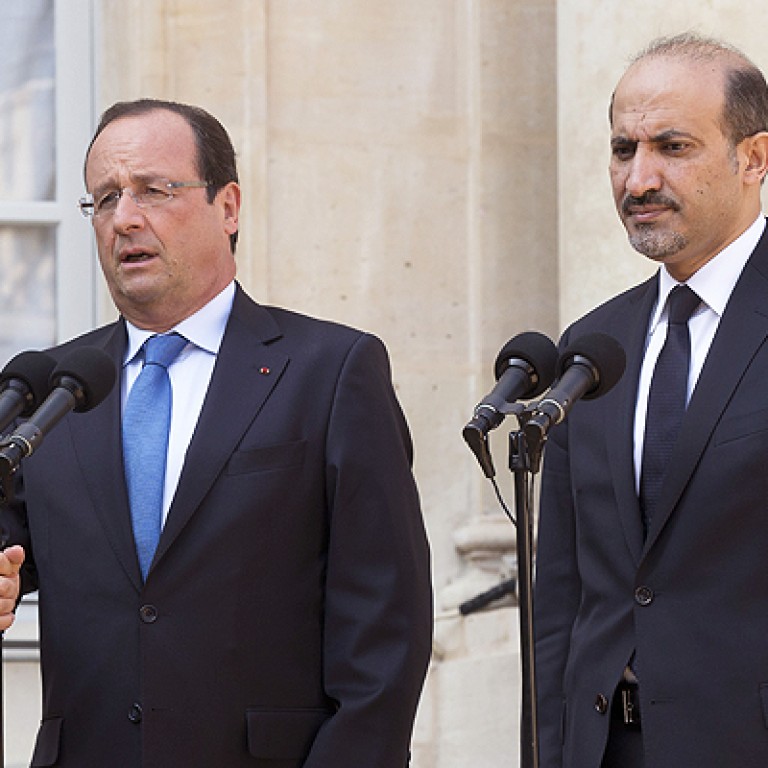
France backs US on Syria action despite British refusal
Hollande says punitive action must be taken over gas attack
President Francois Hollande said a British parliamentary vote against taking military action in Syria would not affect France’s will to act to punish Bashar al-Assad’s government, which it blamed for a chemical attack on civilians.
Hollande told the daily Le Monde he still supported taking firm punitive action over an attack he said had caused irreparable harm to the Syrian people, and said he would work closely with France’s allies.
Diplomatic sources said that while the British decision could add to the French public’s reservations about strikes, Hollande may now feel an even stronger duty to carry through on a promise to punish the perpetrators of the poison gas attack.
“The chemical massacre in Damascus cannot and must not go unpunished. Otherwise we’d run the risk of an escalation that would trivialise the use of these arms and put other countries at risk,” Hollande told the newspaper.
Each country is sovereign to participate or not in an operation. That is valid for Britain as it is for France
Asked if France could take action without Britain, he replied: “Yes. Each country is sovereign to participate or not in an operation. That is valid for Britain as it is for France.”
France, the former colonial power in Syria, has backed the opposition rebels since the start of the conflict yet is worried spiralling violence could spill over into Lebanon, where it has its strongest political and economic links in the region.
France has some 20,000 nationals living in Lebanon, myriad companies operating there and a peacekeeping force of around 800 soldiers. Diplomatic sources say Paris fears Assad’s forces could attack its interests there in retaliation for strikes.
Unlike British Prime Minister David Cameron – who lost a parliamentary vote sanctioning military intervention on Thursday – Hollande could, if he chose, act before a French parliamentary debate set for Wednesday.
Hollande, who was due to talk on Friday to US President Barack Obama, told Le Monde France had “a stack of evidence” that Assad’s forces were behind last week’s gas attacks. “I believe punitive action must be carried out against a regime that is doing irreparable harm to its people,” he said.
France would act if the conditions justified it, he said, and any response would be firm and proportionate.
“There are few countries that have the capacity to inflict a sanction by the appropriate means. France is one of them. We are ready. We will decide our position in close liaison with our allies,” Hollande said.
France most likely would deploy Rafale and Mirage fighter jets fitted with Scalp air-to-surface missile with a range of up to 250 kilometres, from Corsica in the Mediterranean.
Public lukewarm
France and Britain have become close diplomatic allies in the years since their disagreement over joining the 2003 US-led war in Iraq and coordinate closely in defence operations.
Cameron stood shoulder-to-shoulder with Hollande’s predecessor Nicolas Sarkozy two years ago when the EU members launched air strikes against the forces of former Libyan leader Muammar Gaddafi to stop his crushing of a rebel uprising.
French diplomatic sources said Paris had been braced for a refusal by British lawmakers to countenance British military action over Syria. While disappointing, it would likely make France more determined to join any US action, they said.
“It wasn’t a surprise that Cameron lost the vote but it has made Hollande’s decision more complicated and more political. There are a lot of parameters to take into account,” one senior source told reporters. “It’s not an easy decision.”
He said France had not yet decided on its course of action but believed that not acting would create a dangerous precedent.
Francois Heisbourg, a special adviser at the Foundation for Strategic Research and former defence ministry adviser, said France was now waiting for the US government to make public its own intelligence assessment about the chemical attack.
“The Americans will make their proof public this afternoon. It will prejudge what Obama will say and he will, either privately or publicly, let loose the dogs of war,” he said.
Two opinion polls published this week, and carried out after the gas attack in Damascus, indicated lukewarm support among French voters for military intervention in Syria.
A survey by pollster CSA found 45 per cent of respondents would support a UN military intervention and 40 per cent would be opposed. Separately, 59 per cent of people in an IFOP poll did not want France to take part in any intervention.
Hollande, whose popularity has been hurt by economic gloom, showed unexpected military mettle when he dispatched troops to help Mali’s government fend off Islamist rebels earlier this year, an intervention backed by two-thirds of the public.

